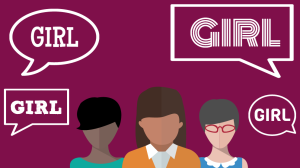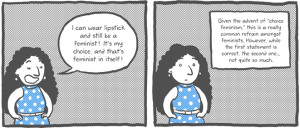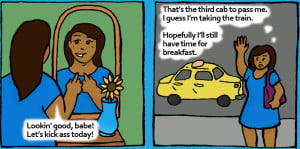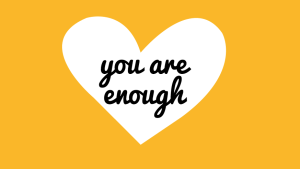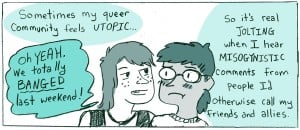I landed my first feminist internship when I was a freshman in college. And it was there that I made a very frequent mistake: In writing about situations involving grown women, I would repeatedly call them “girls.”
It didn’t take long for me to be informed that it was unacceptable, especially in writing and particularly news writing, to refer to adults as “boys” or “girls.” This seems like common sense now, although actually putting it into practice can still be hard for me.
And that’s because saying “girl(s)” comes naturally to me, as it does to so many of us. But just like calling groups of people “guys” is a widespread and completely normalized practice that inadvertently minimizes the existence of women, so does calling groups of people “girls.”
And yet, unlike using “guys” as a third-person plural catchall, the use of the word “girls” to refer to women is very rarely called out on as sexist. In fact, it still goes largely unnoticed, even by people who should “know better.”
Even I’m still guilty of calling women “girls.” Even though I know I shouldn’t, the word still finds its way to the tip of my tongue. And I hear it everywhere in my circles, too.
People, including me, go out with “the girls,” identify themselves and their friends to the world as “girls,” and talk generally about women’s issues by talking about the lives of “girls,” even when they mean “women.”
Even media with feminist leanings use “girls” as a catchall for adult topics or stories about adult women.
Think of shows like Girlfriends, New Girl, Gilmore Girls, and even Lena Dunham’s own Girls. Or movies like Girl with the Dragon Tattoo; Girl, Interrupted; and Dream Girls. Even the book Girlboss is guilty of it.
That’s because calling women “girls” is commonplace, and most people don’t bat an eyelash when they do it or when they hear someone else doing it.
In fact, calling women “girls” is so normal that people actually feel uncomfortable calling them “women” instead.
Countless think pieces chronicle an author’s journey to decide when one is not a girl or, conversely, not yet a woman. Feminists and non-feminists alike have documented their own attempts to nix the phrase completely, often, in the process, realizing how weird it feels to call the adult ladyfolks in their lives “women.”
But here’s the thing: Calling a woman a “girl” isn’t okay.
When we call women “girls,” we’re using the force of language to make them smaller. We resist and deny their maturity, their adulthood, and their true power.
When you call a woman a “girl,” you’re actually saying a lot of very serious things about gender politics and womanhood.
This is a call to action. We need to actually start using “women” when that’s what we mean. Because when we refer to women as “girls,” this is what we’re doing.
1. When We Call Women ‘Girls,’ We’re Infantilizing Them
The textbook definition of a “girl” is a female-identified person under the age of 18.
In that way, the term refers to children. And using it to talk about adult females – women – infers that women are, in some way, still immature or childish.
In that way, calling women “girls” (very actively) infantilizes them.
The infantilization of women occurs across realms, especially in American culture.
Advertisements and other forms of media portray women as being childlike and immature. People of all genders are socialized to see women as helpless, irrational, weak, and in need of protection, and legislators feel it’s okay to tell women how to run their lives and what to do with their bodies. We handle women with “kid gloves,” as if their emotions are going to make them incapable of rational behavior in times of stress or conflict.
Of course, our shared cultural tendency to refer to adult women as “girls” isn’t the only example of our culture’s infantilization of women or obsession with women’s youthfulness.
We live in a society where women’s bodies are only seen as attractive, desirable, and – thus, because of the patriarchy – worthy and valid when they fit an ideal standard of beauty. That standard is undeniably sexist. But it’s also racist, ableist, cissexist, heteronormative – and ageist.
Women are only seen as beautiful when they’re young – and a huge amount of pressure is put on women to look, act, and seem young for as long as possible.
As women age, they also see less of themselves reflected in the world around them. They’re less likely to encounter stories similar to their own in books, movies, or television shows. Advertisements rarely apply to them, unless they’re for anti-aging products. And the women they do see who are their age are being praised for “not looking” it.
As our culture demands women stay young forever in order to retain their socially constructed sexual attractiveness (and thus, usefulness to the patriarchy), it also sexualizes young women and girls – and the adult women who look like they’re under 18.
American Apparel came under fire over and over again for producing advertisements that sexualized either adult women who appeared to be underage or actual minors.
Adult actresses are routinely asked to play characters who are younger than they are (and even minors!), which results in a skewed media portrayal of young womanhood. And as a result, actual girls – who are under 18 and not legal adults – are seen as sexually desirable and available.
And thus…
2. When We Call Women ‘Girls,’ We Perpetuate Rape Culture
The end result of all that infantalization and sexualization?
Our society’s obsession with women looking, acting, and being young has fueled a rape culture that victimizes young women and girls.
Here’s what that looks like:
Older women are told they’re not desirable, and advertisers coax them into doing all they can to preserve their youth and vitality. Meanwhile, younger women and girls are bombarded with messages that tell them their worth is measured via their sexuality.
An APA study in 2010 found that young women and girls are sexualized rampantly in our culture. The study defined “sexualization” as occurring when:
a person’s value comes only from his or her sexual appeal or behavior, to the exclusion of other characteristics;
a person is held to a standard that equates physical attractiveness (narrowly defined) with being sexy;
a person is sexually objectified – that is, made into a thing for others’ sexual use, rather than seen as a person with the capacity for independent action and decision making; and/or
sexuality is inappropriately imposed upon a person
Sound familiar?
I know it does.
Because it’s rape culture.
And that same rape culture also infantilizes adult women (as well as young women and girls) by denying them their sexual agency. Survivors of sexual assault are questioned, and they’re overwhelmingly not believed. They’re seen as irrational and perceived to be devious and untruthful.
When we call women “girls,” we’re playing in to all of that.
We’re feeding the double-standard that says grown men are sexy into their 60s, while women are best appreciated when they’re close to 18 (“barely legal,” anyone?).
We’re perpetuating a norm in which being a “woman” means the end of being desirable and the beginning of the slow death of someone’s societal worth.
By reclaiming the word “woman,” and using it to refer to grown-ass adults as we should, we fight back against the infantilization of women. And when we do, we cut short a rape culture that sexualizes actual girls at the same time.
3. When We Call Women ‘Girls,’ We’re Disrespecting Them
Despite what appears to be a widespread discomfort with the term “women,” folks don’t seem to be uncomfortable disrespecting women by referring to them en masse as children.
We don’t seem to realize that “girl” is a diminutive term or to think critically about the ways in which perceiving of women as “girls” disrespects them.
Our society regularly discredits women, often because they’re perceived as immature, incapable, or otherwise less than their adult male peers.
That’s because, for the most part, our culture sees women the same way they see actual girls: weak, frivolous, dependent, foolish, irrational, impulsive, and impetuous.
When we call women “girls,” we conflate them with their younger counterparts in the turn of a phrase. We’re indicating that they are more alike to children than to adults.
And that’s incredibly disrespectful, not to mention disempowering.
Calling women “girls” plays into a sexist culture that refuses to see women as whole, independent people with valid feelings, thoughts, and opinions.
When we call women “girls,” we make it easier for their bosses to dismiss their suggestions or look them over when it’s time to promote folks to leadership positions. When we call women “girls,” we fuel an academic system that sees women’s philosophical and intellectual pursuits as meaningless. When we call women “girls,” we make it easier for people to assume they lack strength, capability, and competency.
When we call women “girls,” we communicate that we don’t see a huge difference in the minds or behaviors of women and girls. Instead, we insist that women, of all ages, are childlike and immature.
We don’t call men “boys” on the regular, and that’s because we see men as adults – as authority figures in their own lives as well as the lives of others, as wise, as rational.
That empowers men to take risks, innovate, and go their own way. It also bestows upon them the male privilege of being assumed to have expertise, skills, and knowledge that we wouldn’t assume boys have, because they’re kids.
As a culture, we refuse to envision the same growth for girls who become women.
That’s why calling women “girls” is so problematic – it hinders women’s abilities to really see themselves as leaders, thinkers, and doers.
Women are already swimming in a sea of male privilege and entitlement. They’re surrounded by and often part of male-dominated institutions in what is undeniably a male-dominated society.
Being seen as on par with their male peers – and using equivalent terms to address and categorize them as we do men – can empower women to really tap into their potential and push other folks to take them seriously.
4. When We Call Women ‘Girls,’ We’re Not Taking Them Seriously
We care deeply about their well-being and personal growth and we listen closely as they articulate their own needs – or at least we should – but we don’t take them seriously.
We don’t trust them with major decisions about finances and lifestyle choices; we don’t task them with complex and meaningful work; and we don’t expect them to be self-sufficient or entirely responsible.
We don’t treat men the way we treat boys – and we shouldn’t. Because we shouldn’t treat adults the way we treat children.
But often, we don’t take women seriously enough to do the same for them. Often, we treat women like children by disregarding their voices, experiences, and ideas altogether.
For example, their political demands aren’t often taken up, despite the fact that women represent a majority of the voting population and consistently turn out well for elections.
Women have fought political battles for the right to do what they will with their own bodies, pursue the same leadership opportunities as men, and end some of the tragic circumstances of their own lives like violence and the feminization of poverty.
But legislators and the general public alike have spoken over them, insisted they know better, and sometimes even insisted they were limiting women’s options for their own good.
Further, their ideas and suggestions are ignored, mocked, or silenced – and sometimes, credit for those ideas and suggestions are even stolen.
Women throughout history have had their contributions to science, math, philosophy, and politics rendered invisible by sheer ignorance or blatant misinformation. They’ve been effectively cut out and pushed out of positions of power through which they could spark change. They’ve had their ideas shot down, laughed out, and robbed from them by men in positions of power.
And their own needs and experiences are mansplained back to them, dismissed as excessive, or straight-up unacknowledged.
When women explain how they’re feeling, they get gaslighted: Other people tell them they’re “just imagining it,” or that they’re “crazy” (which is hella problematic in and of itself).
People try to explain away their realities and challenge their own intuitive sense of self. Women who speak up demanding to live free from violence, discrimination, and harassment are told they’re asking for “special treatment.” And often, women who claim to have experienced violence, discrimination, and harassment aren’t believed.
And these examples may feel unrelated, but the truth of the matter is that this huge system that consistently puts women at a disadvantage (uhh, we call that “patriarchy”) works both in major and minute ways.
And when we call women “girls,” we’re feeding into the same machine that reminds them constantly that we don’t take them seriously.
And that means they don’t matter.
***
Because our society diminishes women and their contributions, they’ve remained largely invisible in our history. We erase them, or rewrite their stories, or tell their stories without ever saying their names.
And we do this to reduce them so as to make them take up less space and garner less recognition. We do it to make them smaller. Like girls.
But women deserve space. Women deserve recognition. Women deserve to contribute.
Women deserve to be perceived as capable, intelligent, independent, freethinking, rational, self-sufficient, responsible, and mature.
Women deserve to be acknowledged for what they are: Grown Ass Women.
And anything less just won’t do.
[do_widget id=’text-101′]
Carmen Rios is a Contributing Writer for Everyday Feminism. She splits her time disparately between feminist rabble-rousing, writing, public speaking, and flower-picking. A professional feminist by day and overemotional writer by night, Carmen is currently Communications Coordinator at the Feminist Majority Foundation and the Feminism and Community Editor at Autostraddle. You can follow her on Twitter @carmenriosss and Tumblr to learn more about her feelings.
Search our 3000+ articles!
Read our articles about:
Our online racial justice training
Used by hundreds of universities, non-profits, and businesses.
Click to learn more


